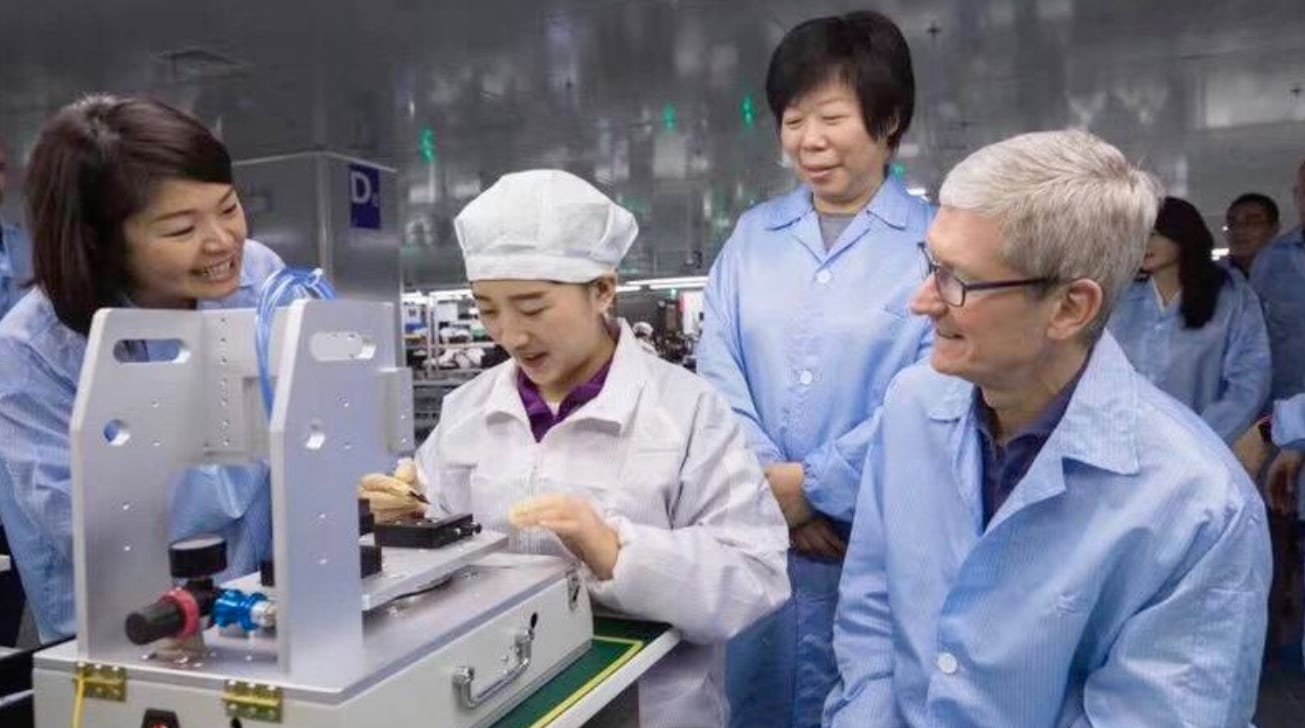Apple CEO Tim Cook is in the crosshairs of at least one U.S. lawmaker over a recent report claiming Chinese firms in the tech giant's supply chain exploit Uyghur labor.
An explosive report from The Information on Monday exposed potential ties between Apple suppliers and forced labor programs suspected of being part of an alleged Chinese genocide against Uyghurs.
An investigation conducted by human rights groups appears to reveal evidence against seven Chinese firms — Advanced-Connectek, Luxshare Precision Industry, Shenzhen Deren Electronic Co., Avary Holding, AcBel Polytech, CN Innovations, and Suzhou Dongshan Precision Manufacturing Co. — each of which provides parts and services to Apple.
Notably, Cook has touted the operations of Lens, O-Film, and Luxshare, the latter of which he personally visited in a 2017 trip to China.
U.S. Rep. Ken Buck, R-Colo., in a letter to Cook on Tuesday expressed "deep concern" over the report. Buck invoked Cook's statements from a House Judiciary Committee hearing in July 2020, when the executive called forced labor "abhorrent" and something Apple "would not tolerate." At the time, Apple supplier O-Film was under scrutiny for alleged human right violations.
The congressman went on to credit Apple for culling O-Film from its supply chain, but admonished Cook for the recently surfaced allegations.
Buck in the letter asks Cook to clarify Apple's relationship with each company listed in Monday's report and provide documentation relating to internal investigations into forced labor or human rights abuses connected to said firms. Also requested is a "thorough description" of the process Apple undertakes to ensure suppliers are not exploiting workers. Buck also wants to know how Apple intends to keep human rights related malfeasance out of its supply chain.
Cook is asked to pen a reply by June 15.
Apple's reliance on China-based manufacturing has been a topic of debate for well over a decade. The subject came to the fore in 2010, when a spate of worker suicides at factories owned by Foxconn stoked rumors of iPhone sweatshops.
Apple has repeatedly pledged to end human rights abuses, including child labor, poor working and living conditions, forced overtime, and more, at facilities run by Chinese business. To that end, the company holds suppliers to a strict code of conduct, funds regular audits of its partners and releases an annual supplier responsibility report. It also offers a range of education and enrichment programs to supplier employees.
Prior to The Information's report, Apple was in December accused of allowing human rights abuses at facilities run by key partners including Foxconn, Pegatron, and Quanta.
 Mikey Campbell
Mikey Campbell







-m.jpg)






 Marko Zivkovic
Marko Zivkovic
 Mike Wuerthele
Mike Wuerthele
 Christine McKee
Christine McKee
 Amber Neely
Amber Neely
 Sponsored Content
Sponsored Content
 Wesley Hilliard
Wesley Hilliard

 William Gallagher
William Gallagher









16 Comments
Its all about the bottom line$
Not just Apple btw
I agree: Tim Cook didn't know he was using slave labour, if that actually happened. But check this short clip to understand what's really happening:
https://www.youtube.com/watch?v=F69dzy__Ao8
This problem cannot be solved by anyone at Apple (or any other company) because Apple can't control what happens in China behind the iron curtain. This is simply what you may get for doing business with any dictatorship, not just China.
But Apple can't claim innocence. Does Apple just obey the laws of China or does it have a higher standard and obey all the laws that are present in America and apply American rules and laws to all its workers and subcontractors in China as if they were working in America. Eg, minimum wages, maximum hours, paid leave, racial hiring equity, right to compensation if workers are injured on the job, pensions, right to unionize, whistleblower protection, right of employees to avoid polygraphs, right to family leave for birth or adoption, etc. I could list dozens of US Federal Laws that Apple (or any other company) probably does NOT choose to follow when it comes to foreign workers. If Apple treated its employees in America like its contractors in China are treated, the entire Board of Directors at Apple would probably be in jail. Apple products are cheaper when they are made in China because no American law, not even the rights in the US Constitution, apply to any workers in China when they are working for Apple directly or indirectly. So if an employee in China is suspected of leaking valuable information about Apple's products, even without probable cause or a warrant (a warrant doesn't matter much in a dictatorship that doesn't have an independent judiciary) that employee's home and property can be intrusively searched by the employer or the government, in order to protect Apple Corporation back in the USA. And Apple's hands are clean.
It's always good when this is exposed as it's an opportunity to improve - it's not the first time and likely won't be the last. Keep in mind that this is a cat and mouse game, remember their government made this and are actively endorsing and encouraging its use.
Not to be too philosophical, but any interaction in this country will in someway involve the government who are responsible for the forced labour. Where does one draw the line in their dealings?
If this was a company, let's say Walmart (insert anything there): would you still shop there but only buy the products which aren't tainted by the forced labour - or would you boycott the store altogether because shopping there helps facilitate the evil actions of the company?